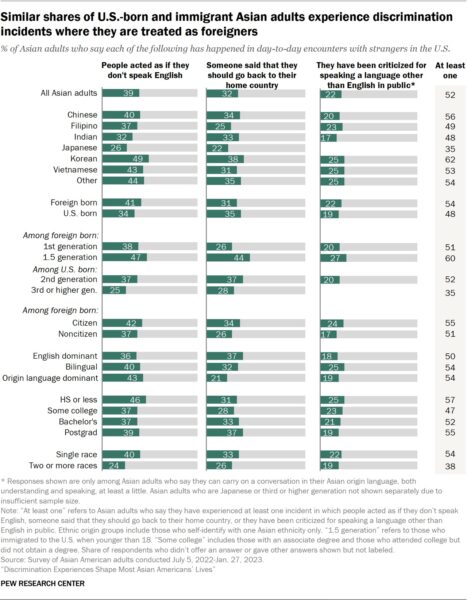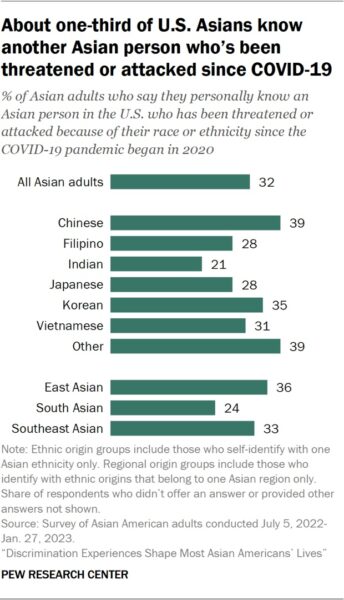By Angelina Chiang
In the recent study conducted in 2023 by PEW Research about ongoing racism towards Asians and Asian Americans, there was clear and evident data that show how discriminatory attitudes and behaviors are still ongoing, despite many efforts to promote inclusivity and increase awareness on this matter. Discrimination against many Asian Americans can take on multiple forms–they are not confined to individual incidents.
Discrimination against Asian Americans in the United States has been long-standing throughout history. From the Chinese Exclusion Act of 1882 and the denial of naturalized U.S. citizenship until the 1940s, to the internment of Japanese Americans during World War II, and targeted racism towards South Asians following the terrorist attacks of September 11, 2001, Asian Americans have consistently faced prejudice and exclusion. Whether or not Asian Americans were born in America, they are often being perceived as outsiders.

The outbreak of the Coronavirus in 2020 has led to a concerning rise in discrimination and violence against Asian Americans. In the same research conducted by Pew Research, a survey in 2021 revealed that one-third of English-speaking Asian adults expressed fear of being threatened or physically attacked. An immigrant Korean woman in her early 50s, who claimed that, “It seems that they [white people] can’t distinguish between Korean and Chinese and think that we are from Asia and the onset of COVID-19 is our fault. This is something that can happen to all of us,” The experiences of individuals highlight the lasting presence of racism in our society and the need for education and empathy towards Asian American communities.
In another 2022-23 survey found in the research, Asian adults were asked if they knew another Asian individual in the U.S. who had experienced an attack since the start of the pandemic. The results showed that 32% of them did. This striking statistic expresses the fear and reality of violence that many Asian Americans face in their daily lives.
However, the survey findings varied across different Asian ethnic groups. It revealed that East Asians, such as Chinese and Korean Americans, reported higher rates of knowing someone who had been threatened or attacked. For example, about four in ten Chinese adults were able to report on this instance. This could partially be due to racial scapegoating and stereotypes that started during the early pandemic, especially when the virus was heavily associated with China. Vietnamese, Japanese, Filipino, and Indian adults reported slightly lower rates of knowing someone who had been a victim of a racially motivated threat or attack. The results of the research still show how this discrimination affects all Asian Americans.

These research results highlight the danger of using racially charged language, such as “Chinese Virus” or “Asian Virus” to describe COVID-19 has been shown to increase anti-Asian sentiment. Popularized by prominent public figures, including former President Donald Trump, such language not only prolonged stereotypes but also contributed to a hostile environment for Asian communities. It is crucial to be mindful of the language you use. Discriminatory languages have real-life consequences.




